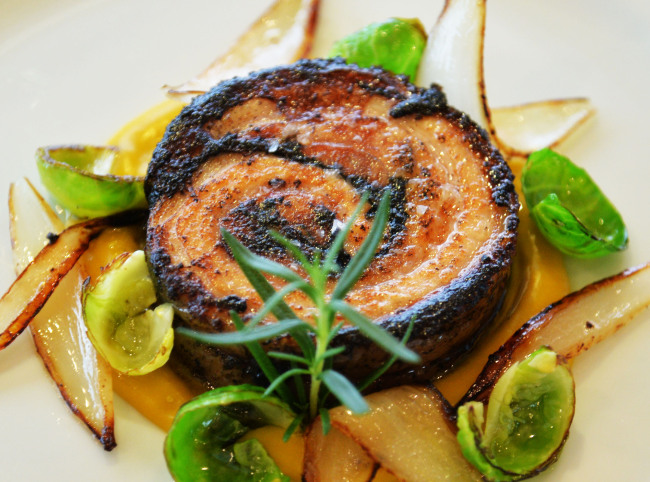For diners who want Italian food with a twist, look no further than Spark, Park Sung-woo’s first stint as restaurant owner and chef.
Situated in Seoul’s Sinsa-dong area, the new establishment, which tentatively opened in September before an official launch in November, strays away from traditional Italian and into slightly uncharted territory with local ingredients.
 |
Spark's black port is crafted from pork belly that has been marinated in squid ink, balsamic vinegar and herbs and topped with a lemon-chervill confit (Yoon Byung-chan/The Korea Herald) |
Korean red chili peppers, “yuja” -- citron -- and “maesil” -- Chinese plum -- add a kick to Sicilian classics like arancini and cannoli.
Jerusalem artichokes, called “dwaeji” potatoes in Korea, are transformed into a hearty soup topped with salty ribbons of prosciutto ham and crisp Jerusalem artichoke chips.
Arancini cooked until it’s creamy on the inside with rice, Parmigiano Reggiano and the flesh of “samchi” -- Japanese Spanish mackerel -- gets amped up with “maesil,” paprika and a garnish of anchovy mayo and marinated local red chili peppers.
“Ogyeopsal” -- pork belly -- that has been marinated in squid ink, balsamic vinegar and herbs is rendered to a luscious juiciness by being cooked sous vide at a low heat for over 12 hours before being seared and garnished with a confit crafted from lemons, chervil and honey.
Sometimes, Park completely colors outside the lines with dishes like his distinctly Korean canapes of puffed seaweed-infused rice crackers topped with ricotta cheese, red wine grape compote and sundried tomatoes.
Experimentation seems to suit Park.
Dishes are beautifully plated, toothsome and fragrant, marrying crisp and soft textures with salinity, umami and a touch of sweetness.
“I want to apply Italian techniques to local ingredients here,” said Park, 33, who first aspired to be a chef at the age of 16.
Park started off by learning how to cook Korean food before gaining experience at Italian restaurants in Singapore and at a Michelin-starred restaurant in Italy.
Realizing his goal of helming his own restaurant before he turns 35, Park stays committed to trying to give his diners a “different” experience.
That ambition not only shines through in his appetizers and main dishes, but in his desserts as well.
A nod to his stint in a kitchen helmed by a Sicilian chef, Park serves up his variation of cannoli, at times a chestnut-hued tube, at other times in the shape of a cone, sporting tiny little bubbles all over its thin, crackly crisp surface and filled to the gills with a blend of ricotta, mascarpone and white chocolate mousse.
“You need to allow the batter to ferment,” said Park, who remained secretive of the ingredients for his cannoli shells, which are eggshell thin and crisp and light.
If one is lucky, one will go on a day when the cannolo arrives garnished on both sides with crushed pistachios and yuja. The smooth, creamy filling, sporting the slightest tang and a rich flavor pairs well with fragrant citron.
Spark
656-7 Sinsa-dong, Gangnam-gu, Seoul
(02) 543-8986
Open noon to 3 p.m., 6 p.m. to 10 p.m. daily, closed Sundays
Lunch prix fixe courses cost 25,000 won to 35,000 won, dinner prix fixe courses cost 58,000 won
By Jean Oh (
oh_jean@heraldcorp.com)








